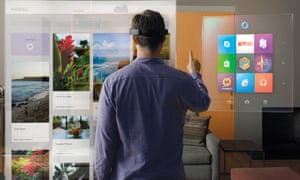Surgeons are embracing technology’s cutting edge, using the latest in augmented, virtual and mixed reality, to transform medical training.
Among the devices the Royal College of Surgeons is planning to explore is the Microsoft HoloLens, a mixed reality headset, released to developers this year, which shows hovering 3D holograms.
The college said it was teaming up with education group Pearson, to harness immersive technologies for training students.
Mark Christian, global director of immersive learning at Pearson, said that with the HoloLens headset they could explore the possibility of creating realistic holograms to allow students to practise surgical procedures.
He said the approach could avoid traditional cadaver-based training. “You have schools like Case Western Reserve University that have that as their stated goal – within two years to do away with wet labs,” he said.
The potential for such technologies, he added, would be further boosted through the development of haptic technologies, which let wearers of the HoloLens and other devices, such as virtual reality headsets, experience other sensations, such as touch.

Immersive technologies could also prove a boon in the field of imaging; using the HoloLens doctors could explore entire brains, in images built up from MRI scans, floating in front of their eyes. “It’s there, [in] actual 3D,” he said.
Shafi Ahmed, council member of the Royal College of Surgeons, said the technologies were the future when it came to education. “[In the next five years] I think most people will be taught with this AR, VR, mixed reality,” he said. “Learning will change immeasurably.”
He added: “We are rebuilding [the college] for 2020. In that new classroom environment there will be no space for cadavers, it’ll be case-based anatomy, it’ll be teaching and learning using HoloLens and virtual reality – really disrupting 200 years worth of surgical training.”
But it might be some time before cadavers are completely replaced by technology. Andrew Reed, chief executive of the Royal College of Surgeons, noted the college would continue to offer cadaveric courseselsewhere in the UK in partnership with other faculties.
Ahmed, who is a cancer surgeon at Barts Health NHS trust and co-founder of Medical Realities, a company working with augmented and virtual reality, is a pioneering figure in the world of medical technology. In April 2014 he live-streamed an operation using the augmented reality device Google Glass, and in May this year he live-streamed the first 360-degree video of an operation.
He stressed that that approach was not a gimmick. His vision, he said, was to shake-up surgical training, and do away with traditional approaches whereby students in theatre barely caught a glimpse of procedures, while democratising access to training across the world. “Two-thirds of the population, five billion people out of seven billion do not have access to safe and affordable surgery,” he said.
Among other devices under development around the world are alternative approaches to hologram technology, such as that from the company Holoxica, which aims to project 3D holograms into a space without headsets.
And augmented reality is also finding its niche. Xpert Eye by Ama is based on smart glasses that allow doctors to remotely provide advice and support to those wearing the glasses, in what the creators dub a “see what I see solution”.
It was not only doctors that could benefit from the new wave of technology, said Ahmed, pointing out that immersive approaches could aid patients too.
“The real value of this stuff is already shown in patients with anxiety attacks, phobias, pain relief, and also in patient education,” said Ahmed, pointing out that VR headsets offered patients a chance to see what would happen to them during a procedure, or even watch their own surgery in retrospect.
Christian agreed, saying technologies like the HoloLens could offer patients a view of the inside of their own bodies. “I think people rationalise things more in a visual way,” said Christian. “We know that an informed patient [has] better outcomes.”
Medical trainers look to virtual reality tech
Hiç yorum yok:
Yorum Gönder